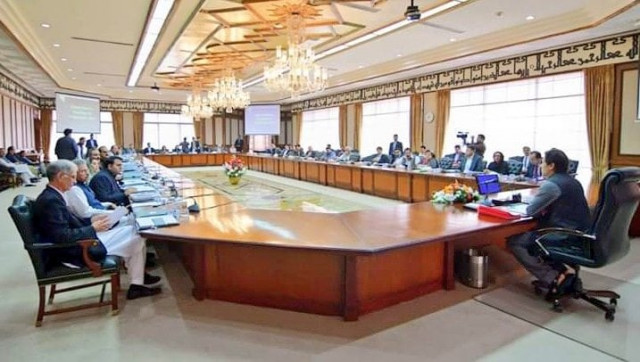Cabinet refuses to allow LNG import from Turkey
Does not give nod for inking amended deal, saying Ankara is not an LNG exporter

File photo of PM Imran Khan chairing federal cabinet meeting. PHOTO: RADIO PAKISTAN
Sources told The Express Tribune that an agreement was inked by the previous government of Pakistan Muslim League-Nawaz (PML-N) with Turkey for LNG import in a government-to-government arrangement without going into the bidding process.
However, the new Pakistan Tehreek-e-Insaf (PTI) government came to know that Turkey was not an LNG exporter and was of the view that there was no rationale for gas import from there.
Cabinet members, in a recent meeting, argued that the rationale for signing the deal with Turkey should be reviewed and agreed to refer the matter to the Economic Coordination Committee (ECC) for its consideration.
An inter-governmental agreement between Pakistan and Turkey was signed on February 23, 2018 after obtaining approval from the cabinet. Pakistan State Oil, Pakistan LNG Terminals Limited (PLTL) and Turkish Petroleum International Company were nominated in the agreement for LNG trade.
The cabinet was told that Pakistan LNG Limited (PLL), which had been established for LNG imports, was not mentioned among the nominated companies in the agreement.
Earlier, the Law and Justice Division, while responding to a request for its views, suggested that proposed amendments could be made by the two sides by signing an amended protocol. It also said approval of the cabinet would be required for signing the protocol.
The Law Division cleared the draft of amended protocol from the legal point of view. The Turkish side also agreed to the draft amendment.
Then the cabinet's approval was solicited for signing the protocol in order to amend the agreement for cooperation in the field of hydrocarbons.
At present, Pakistan has two LNG terminals having handling capacity of 1.2 billion cubic feet per day.
However, the board of directors of PLL has barred the company from importing additional cargoes, leading to under-utilisation of the second LNG terminal for the past few months, putting an extra burden on consumers and depriving them of cheap electricity.
PLL is importing three cargoes per month - half the handling capacity of the LNG terminal.
The PLL management has been pushing the Ministry of Energy (Petroleum Division) for months to ask the Power Division to place a firm demand for LNG consumption in power plants as it was a cheaper fuel.
Instead, it said, the power producers were consuming expensive furnace oil, which was putting an additional burden on the consumers because of high electricity rates.
Published in The Express Tribune, November 2nd, 2018.
Like Business on Facebook, follow @TribuneBiz on Twitter to stay informed and join in the conversation.



















COMMENTS
Comments are moderated and generally will be posted if they are on-topic and not abusive.
For more information, please see our Comments FAQ